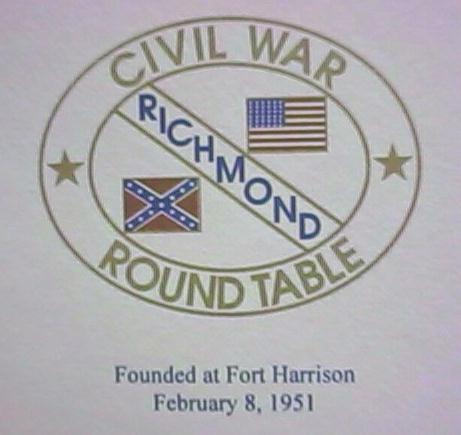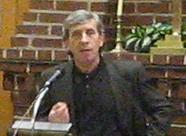


April 2004
rcwrt.org
First Vice President: Rob Monroe, Editor Richard Forrester 2416 Edenbrook Dr. Second Vice President: Richmond, VA 23228-3040 Shep Parsons rmonroe@richmond.com
April 2004 PROGRAM Mark G. Malvasi, "My Brother's Keeper: Proslavery Thought and the Southern Critique of Modernity" 8:00 p.m., Tuesday, April 13, 2004, at the Boulevard United Methodist Church, 321 N. Boulevard, Richmond, VA (corner of Boulevard and Stuart Ave.) Enter the basement door on the right side under the front steps. Mark G. Malvasi received a B.A. in history from Hiram College in Ohio, a master's in history from the University of Chicago and a Ph.D. from the University of Rochester where he studied under renowned historian of slavery and the South, Eugene D. Genovese. Malvasi has published over 40 essays, editorials and reviews in newspapers, journals and anthologies. He is author of The Unregenerate South: The Agrarian Thought of John Crowe Ranson, Allen Tate, and Donald Davidson and Slavery in the Western Hemisphere, c. 1500-1888. At present, Malvasi is completing a study of the southern novelist Andrew Lytle and editing a collection of essays written by historian John Lukacs. Malvasi has taught history and literature at the University of Rochester, the University of Puget Sound and the University of Alabama. In 1992, he joined the department of history at Randolph-Macon College in Ashland. Malvasi will address the Round Table on the topic of slavery. During the 20th century, southern conservative thinkers argued that slavery had come to the South without decision. Their efforts to distance themselves and their tradition from the legacy of slavery have obscured the most critical and imposing insights of their antebellum forebears. The generation of southern thinkers who came of age between 1815 and 1850 recognized the plight of the modern world arising directly from the brutal nature of the so-called free labor system and from the exploitive character of free society itself. They posited slavery as an alternative. What, then, did southerners think they were defending when they defended slavery and why were they willing to risk everything in a great war to do so?
Review of the March Program
 |
Museum of the Confederacy Publishes Cased Images Catalog
Few objects are more moving to the contemporary student of history than old, slightly battered photographic portraits of citizens of a bygone era. For mid-19th-century wartime Southerners, pride, wariness, hope, and sadness were rendered eloquently by photographers whose studios welcomed a steady stream of soldiers, married couples, mothers with children, and war widows. Most of these images that survive today are photographs placed on glass or other material and sheltered in decorative cases, thus known as cased images. The Museum of the Confederacy, which houses one of the nation's largest institutional collections of cased images, has issued the third in its series of museum holdings catalogs, Cased Image Photographs from the Collection of the Museum of the Confederacy, and the wealth of portraits captures a world in transition. Featuring more than 300 photographs, the paperbound book was researched and written by the Museum's staff and photographed by the Museum's Special Projects Director, Tucker Hill, and by Katherine Wetzel. The catalog showcases not only the variety of subjects who sat before the photographer's lens - Confederate soldiers and civilian men, women, children, both white and black - but also representative examples of evolving photographic processes, particularly daguerreotypes, ambrotypes, and tintypes. Although more than a quarter of the cased images are unidentified, all photographs in the catalog are captioned with the type of image and provenance and occasionally a brief paragraph about the subject. For example, this caption accompanies the photograph of an unidentified sweet-faced toddler wearing a white dress and standing in a chair: "According to a story told by the donor, Pvt. Heartwell Kincaid Adams of the 3rd Virginia Cavalry, this ambrotype was in a haversack that he took from the body of a dead Federal soldier at High Bridge a few days before Appomattox. A Federal prisoner in Pvt. Adams' care offered $2 to share the food in the haversack. The prisoner recognized the photograph as his dead brother's child, but he declined to identify or take the picture." In addition to the rich array of 19th-century citizens from all walks of life, the catalog features some familiar names, including Gen. Robert E. Lee, Maj. Gen. J.E.B. Stuart (as a youthful, clean-shaven graduate of the U.S. Military Academy), President and Mrs. Jefferson Davis, and Irishman Maj. Gen. Patrick Cleburne. The 64-page book retails for $12.95. It is available for purchase from The Museum of the Confederacy's Haversack Store via telephone, (804) 649-1861, ext. 26, or the Museum's website, www.moc.org.
RCWRT Members Invited to Attend Meeting on Freeman Markers
RCWRT members are invited to attend a public meeting to discuss the preservation and restoration of the "Freeman Markers." These Civil War roadside markers were erected in the 1920s and named for the famous historian Douglas S. Freeman, who wrote the text for most, if not all of them. The meeting will be held on Monday evening, April 12 (a day prior to the next RCWRT meeting) from 7:30 to 8:30 at the Atlee Branch Library, 9161 Atlee Road in Mechanicsville. Expected to attend are representatives from the Virginia Department of Historic Resources, National Park Service, Virginia Department of Transportation, Henrico and Hanover counties and several citizens groups. For more information, contact RCWRT's Bernie Fisher at 730-1785 or visit freemanmarkers.home.comcast.net.
Upcoming Events
April 17-18 "Civil War Days" at Pamplin Historical Park and the National Museum of the Civil War Soldier. Learn about life on the front and at home during the war. Infantry, cavalry, artillery and civilian demonstrations. Info: www.pamplinpark.org or 1-877-PAMPLIN.
April 24 "Richmond Civil War Day" at Tredegar Iron Works, hosted by the Richmond National Battlefield Park. Special events highlighting the war's impact on the Confederate capital in 1864. Period music, civilian re-enactors, Belle Isle walking tours, artillery and rifle firing demonstrations, living history encampments and drills, children's games and activities. Info: www.nps.gov/rich or 804-771-2145.
RBA Seeks Ukrop's Certificates
Please save your 2004 Ukrop's Golden Gift Certificates to benefit the Richmond Battlefields Association (RBA). Ukrop's will send the certificates to its customers during the month of May. While we know many organizations participate in this program, please try to direct your, and your friends', certificates to help our local efforts to save area battlefields. Please bring your certificates to a RCWRT meeting or mail them to: David West 88 West Square Drive Richmond, VA 23233 Thank you for your continuing support of the RBA!
Chancellorsville and Glendale on List of Endangered Battlefields
Two Virginia sites are among the ten most endangered battlefields according to the Civil War Preservation Trust. The Chancellorsville battlefield is on the CWPT list again this year. The Trust points to the recent failed attempts to build a housing development and a bypass on part of the battlefield as proof of its vulnerability. Also appearing on the endangered list is the Glendale battlefield in Henrico County. The CWPT notes that a housing development now being constructed is taking over 100 acres of land near the Glendale National Cemetery and only a fraction of the battlefield is preserved or protected. Other battlefields appearing on the CWPT's most endangered list are Franklin, TN; New Bern, NC; Wilson's Creek, MO; South Mountain, MD; Mansfield, LA; Morris Island, SC; Fort Donelson, TN and the "Hell Hole" in Georgia.
RCWRT Monthly Speakers for 2004
Newsletter Deadlines To facilitate the printing and timely distribution of the monthly newsletter, information for it should be submitted to the editors no later than the following dates: May newsletter April 30 June newsletter May 28 July newsletter July 2 August newsletter July 30 September newsletter September 3 October newsletter October 1 November newsletter October 29 December newsletter December 3 Information may be emailed to rmonroe@richmond.com
Richmond Civil War Round Table Newsletter Rob Monroe, Editor 2416 Edenbrook Dr. Richmond, VA 23228-3040
Return to News Letters Index
Return to main page

©R.C.W.R.T. 2004